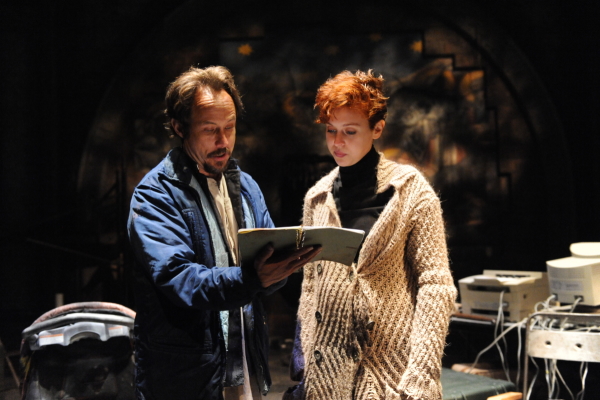Pentecost

(© Stan Barouh)
David Edgar certainly gives audiences plenty to chew on in his intricate play Pentecost, now running in repertory with Gertrude — The Cry at Atlantic Stage 2. Potomac Theatre Project has produced an exemplary staging of the work, which many critics hail as Edgar's most accomplished, layered play. Given our present-day world events, this 20-year-old drama seems like it could have been written yesterday.
Mark Evancho's dynamic set does double duty for Pentecost and its excellent partner play, Gertrude. For Pentecost, the gray-stoned walls become an abandoned church in an unnamed southeastern European country that's trying to get its bearings after the collapse of communism. Behind that wall, art curator Gabriella Pecs (Tosca Giustini) has discovered a fresco that she suspects predates, by 100 years, a similar painting by the 13th-century Italian Giotto. If she's correct, it could mean that Western art actually began in Eastern Europe, and at the hands of a hitherto unknown artist. Gabriella has asked art historian Oliver Davenport (Jonathan Tindle) to weigh in on her find before she has the fresco moved to her museum. However, the country's religious and political leaders also have a big stake in the fate of the fresco, which leads to the question of who has the right to claim it: the church, the state, or the museum.
To skew the odds in their favor, two priests (Lawrence Nathanson and Christo Grabowski) call on Leo Katz (Alex Draper), another art historian, to debunk Gabriella's theory so that an argument can be made for leaving the fresco where it is. While debates rage over the painting's provenance, a group of armed asylum seekers raid the church and threaten to assassinate hostages or destroy the fresco if their demands are not met. Tensions rise between prisoners and captors until the government is forced to enter the fray, with disastrous results.
The large and talented cast tackles this heavy material like professional bodybuilders. Giustini's fiery, precise performance as Gabriella Pecs deserves special mention along with Draper, for his simultaneously odious and heroic Katz, and Jonathan Tindle for his keen portrayal of European abstractedness. In smaller roles, Matt Ball as the minister Mikhail Czaba and Christo Grabowski as the Catholic priest Father Petr Karolyi both dominate the stage when they are on it. Kudos are also due to Mari Vial-Golden for her utterly convincing performance as the stateless Palestinian Yasmin.
Pentecost corrals a hefty number of themes into two hours and 45 minutes, from political upheavals precipitated by religious sects and ethnic groups, to the struggles of refugees uprooted by conflict, to the role of culture and art in defining the individual. Act 1 unfolds like an intriguing art-history mystery, full of theories about the origin of the fresco and the observations on the history of art. But the tone shifts dramatically in Act 2, which contains the elements of a political thriller, complete with armed hostage takers, suspenseful standoffs, and an explosive ending. Despite the sudden twist in the plot, the play becomes richer for its seamless blending of genres.
Edgar weaves his many themes into a brilliant, unified, if at times garrulous drama, but director Cheryl Faraone imbues the work with a gritty, absorbing realism, from the startling pock-pock of gunshots to the overheard whispers of peripheral characters. Hallie Zieselman's lighting heightens the suspense and draws the audience's eyes to all corners of the stage, from the spotlight on the fresco to dusty shadows throughout the church.
As for the play's relevance, one need only flip through today's headlines to find thematic echoes in Edgar's ingenious, carefully wrought play. And it's hard to imagine a more meticulously crafted production. Along with Gertrude — The Cry, Potomac Theatre Project has chosen two meaty plays for summer audiences to sink their teeth into, and both of these brilliantly executed productions deserve your attention.










